Your podcast discovery platform
Curious minds select the most fascinating podcasts from around the world. Discover hand-piqd audio recommendations on your favorite topics.

piqer for: Climate and Environment Global finds Globalization and politics
I'm a freelance journalist, currently based in Madrid. I used to be a News Producer at CNBC in London before, but I thought a little bit more sun might do me good. Now I write for several news organizations, covering a range of topics, from Spanish politics and human rights for Deutsche Welle to climate change for La Marea.
That Coffee You Drank This Morning? The Farmers That Grow It Are In Trouble
Globalization is a damn complicated thing. As we studied it, it's the increase of human relations (financial, political, social, cultural or otherwise) where physical distance doesn't play a role, or its role is significantly reduced. Or something like that.
A couple months ago, fellow piqer Elena Roda recommended an article that caught my attention. It was a story about coffee, and how the most ubiquitous drug in the world may be in serious danger. At least for the not-so-rich among us.
That story stayed with me. It kept me thinking about coffee and its position as a real sign of globalization, with its few ups and many downs, including exploitation of the global south where the coffee grows. This is not, however, an article on exploitation.
This is an article about how a global challenge (climate change) is affecting globalization (coffee). How every little disruption of our delicate system has the potential to wreak havoc all over the world.
Ethiopian coffee farmers are seeing how higher temperatures and a decline in rainfall are affecting their crops of Arabica, the most common coffee species worldwide.
Ethiopia could lose from 39 percent to 59 percent of its current coffee-growing areas to climate change by the end of the century.
And how does this affect the farmers? Badly. If they stick to coffee, they'll have to compete for more productive lands. They are often left out in the cold, resourceless, and can't afford to lead the fight against climate change.
Many farmers are resorting to other crops, such as maize, which damage the environment and empoverish the land. Others won't be so lucky.
If you are also concerned about the little stuff you see every day, this is a very well researched article, excellently written and that covers most angles. I missed an interview or two with the farmers themselves. I understand that the writers haven't travelled to Ethiopia, but you can get around that with a little globalization.
